As some of you may know, for thirty five years, my wife, Janice, the Hopi in the family, and I, the white guy in the family, operated Tsakurshovi, a shop on the Hopi Rez in Arizona. We had a unique business model. In addition to locally produced Hopi jewelry, baskets, and katsina dolls for tourists, we also sold many items that were culturally specific to Hopis, the surrounding Navajos, and the Rio Grande Pueblo people.
We are now retired and spend our time back and forth between our house on the Rez and our little apartment in Flagstaff, a hundred miles away.We had a great run but at age 77 we decided it was finally time to retire while we still have our wits about us and are still physically fit, knock wood. We are now ready to do some serious reading and travel. Yippee! What could go wrong? Can you say homesick? Read on.
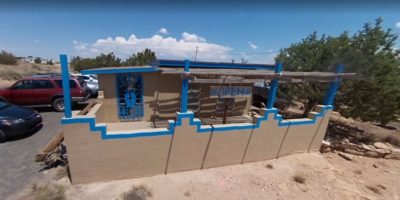
Like most tourism in the southwest, tourism is seasonal at Hopi. It starts with what we called the DINK season (dual income no kids) in April, continues through the summer families traveling with kids season, and comes to a screeching halt at the end of the final DINK season in October. Through the cold winter months of November, December, January, February, and March, any smart tourist in Arizona is sitting under a palm tree by a swimming pool drinking a margarita somewhere near Tucson or Phoenix in southern Arizona. They certainly aren’t in our neck of the woods in northern Arizona where we have winter. On the Rez, we have sleet, snow, black ice, and the occasional white out honest to god blizzard with low temperatures in the teens and twenties and a sub zero wind chill factor. This is not what the snowbirds fleeing the winter in our northern states and Canada are looking for.
During the winter season without tourists, our shop customers were almost entirely the local Hopis as well as neighboring Navajos, and folks from the Rio Grande Pueblos. To be honest, they were always our best customers and not just in winter. Our native customers would come into the shop, know what they wanted, and we didn’t have to explain to them what it was they were buying, what it was used for, or what the designs meant. During the tourist season the shop joke was that we could make and complete sales to four native customers in the time it took to explain to one tourist shopper what the meaning of the design on a Hopi basket meant. Not to mention the time it took to give tourists real non-cellphone non-GPS directions to the interesting nooks and crannies of the Rez. Our little shop joke was more truth than humor.
In the winter it was different. Without tourists, the shop seemed to revert to the remote trading posts of old and became like any small town country store. Almost everyone who came in was local and knew or was related to everyone else and without the need to give directions, answer questions, and explain things to tourists, real Rez conversation about real Rez topics ensued and no topic was off limits. We talked politics state federal and tribal, upcoming religious ceremonies, whose kid was off to college, the local Hopi High School Bruins cross country team, the Phoenix Suns and Arizona Cardinals, who’s having a baby, who just had one and when is the naming ceremony, and plenty of just plain old small town gossip, which flowed like water from the twelve Hopi villages. Many topics were handled with humor and many with serious discussion.
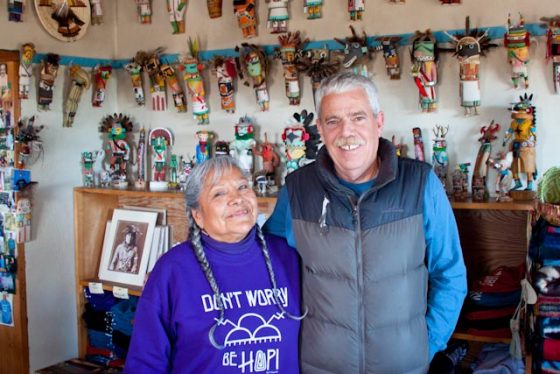
Everyone already knew or was related to the boss, my wife Janice. Everyone also knew me pretty well and over the years I stopped being referred to as the Pahaana (white guy) married to Janice but was referred to and called by the Hopi kinship term for male in-law by members of the four clans Janice was related to. Others used my humorous Hopi nickname which I did not pick but was acquired simply by common community usage and quickly spread to all twelve Hopi villages. As nicknames go, it could have been worse but it wasn’t and when I heard it I smiled.
In short I found myself integrated into the Hopi community as much as a non-Hopi can be. For instance, when Covid hit and Janice’s village had a sign that said, “This Village is Closed To All Nonresidents”, and the closure was being enforced by a manned road block, I was always waved through to haul water for our house just outside the village and on other occasions as well.
Now we live part time, “out home” on the Rez and part time in Flagstaff but we are out home on a regular basis due to weddings, funerals, ceremonies, and other community events that require our presence in one way or another. As we tell Hopi friends and relatives who ask where we live, “We’re really living on the road between the two places”. Urban natives who work and live in Rez bordertowns can relate and so can their friends and relatives who still live and work out home.
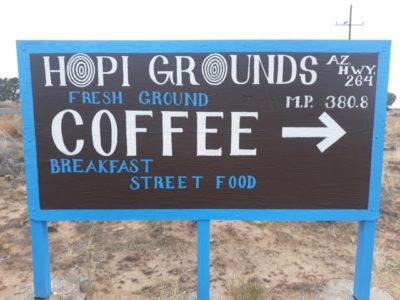
After retirement, our former little shop building adjacent to our Rez house sat empty. The shop was so close to our house that we used to joke about our hectic seven second commute to work. One day when we were home, Gary, a former employee who we’ve known since he was a child, approached us about renting the building. He wanted to fulfill his longtime dream of opening a coffee house on the Rez. Gary pitched his idea, we liked it, and thus Tsakurshovi became the first full time drive up/take out coffee shop on the Rez and the Tsakurshovi sign out front was repainted with a new name, “Hopi Grounds”.
Gary is, to put it mildly, a great go-getter. Drinking your own product as a coffee shop owner will do that for a guy. He sells good fresh ground coffee, Rez breakfast burritos, and breakfast sandwiches that he makes fresh on the spot. He also had the brilliant idea of hanging our world famous, “Don’t Worry be Hopi”, t-shirts out in front of the shop to attract attention. Even though we were retired, the shirts had a life of their own, so we had ordered some to be printed and we were selling them to our many long time regular customers from around the world who knew how to contact us. Now we’ve turned them over to Gary to sell and now he wants us to switch our t-shirts to more fashionable hoodies for winter! As I said, he’s a go-getter. If this keeps up, he may ruin our retirement.
Since the weather is still nice he sets up on the former shop patio and his customers include Hopis, Navajos, and local Anglos who drive by, mostly on their way to work and some who just need a break from whatever else they are doing. In short order Gary’s little coffee shop on the mesa was doing a bang up business with regular customers, not to mention the occasional long haul truck driver or lost tourist who stops by.
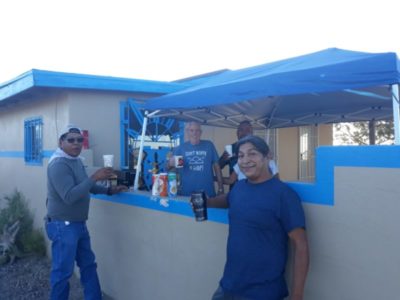
One day when we were out home and I was on our front porch, a semi-truck roared over the little hill on the highway, slammed on his brakes, pulled over on the side of the road, and the driver ran up to the coffee shop. I walked over to the shop and asked Gary, “who was that”? He replied that it was one of his regular customers, a Navajo truck driver who delivered “stuff” all over the huge Navajo Rez that surrounds the Hopi Rez.
What does all of this have to do with the purported topic of my Dispatch from the Rez above, “retired and homesick”? It’s all background for another surprising development at Hopi Grounds.
On one of our first trips back home we went over to check out Gary’s coffee set up but now when we go out home and spend a night or two or three, I always get up at five thirty in the morning and go over to Gary’s shop. I sit behind the counter and hang out talking with Gary and talking to his customers, most of whom I know and who know me. Although in the age of Covid and masks, I usually have to ask, “um haki”, who are you? Since I’m a Pahaana, white, bright, and stick out like a sore thumb in a sea of brown people, everyone already knows who I am as soon they see me.
Often there are also a few other guys who Gary allows to sit behind the counter. As Gary once said, “To sit back here the requirements are to be successful and sober because I don’t have time to listen to losers but plenty of time to listen and learn from those who aren’t”. That being said, sometimes the talk behind the counter gets into sober former drunks telling funny stories of their pre-sober lives and as Gary says, “Sometimes I turn around and it seems like there’s an impromptu twelve step meeting going on”.
However most of the conversation behind the counter is wide ranging about every Rez topic imaginable plus the usual regular gossip, just like the talk I used to hear when Tsakurshovi was open. Hopi Grounds has miraculously become like Tsakurshovi, or that old time trading post or country store I mentioned above. The guys sitting behind the counter have become the equivalent of the guys sitting around the cracker barrel and I was happy to find that the non-stop discussion of Rez things and plain old Rez gossip is still flowing like water. As a former full time but now part time resident, I was happy to join in.
When planning our retirement we had many discussions about what we would miss about living out home all of the time. Janice was worried that I would really miss farming and going to the field every morning where I grew Hopi blue and white corn and beans using traditional Hopi dry farming techniques without irrigation. She was right. I do miss it and, even though she gave her field to a clan daughter, I still sometimes go down to check that field and hoe a few weeds if I see them. However much to my surprise, I discovered that field is only part of what I miss and I made that discovery at Hopi Grounds.
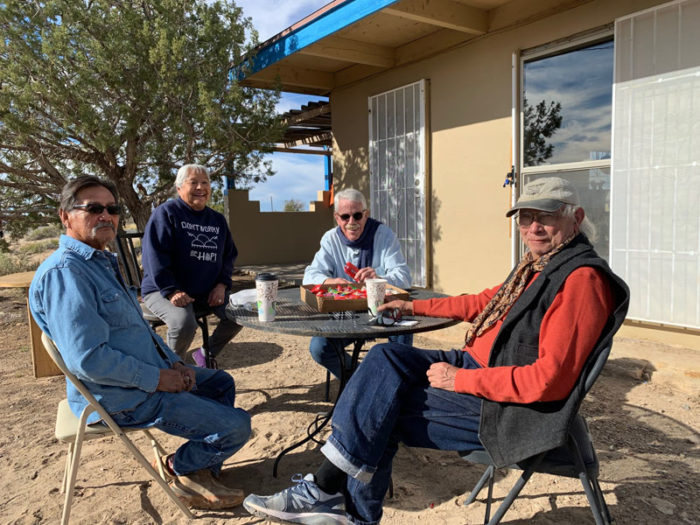
One morning on the patio at the coffee shop, Gary went inside to check on some hot sausage, egg, and cheese sandwiches he had on the fire while a couple of Hopi guys and I were talking about the problem of disagreements over land. The Hopi guys told their land stories and as I was in the middle of telling Janice’s story about how she got her land, Gary walked by to hand over the sandwiches to his customer at the counter. As he walked by, without even looking at me, he simply said, “You’re homesick.” As soon as he gave the sandwiches to the customers and turned around, I replied, “No I’m not. Hunter started it with his land story, Tomo told his land story, and I was just telling Janice’s story.” Gary said, “That’s what I mean, you have one too. Let me ask you, how do you like living with all those white people in town now that you’ve spent most of your life out here?” I was taken aback and really had to think.
I told this to Janice, who had already asked me if I realized that every time we’re out home I spend every morning with Gary and the guys at the coffee shop even though I don’t drink coffee. And did I not remember all the times I’ve told her about running into Hopis in town at the grocery store, bank, post office, or just on the street, wherever and been happy to see them just like everyone from the Rez is when we see each other in town and we greeted each other with, “um waynima/hey you’re around”, and how we always stopped to talk? And what about the time I was peering in at the glass door of the Flagstaff Social Security Office to see if they were open and a native uniformed security guard came to the door, opened it, saw me and said, “um waynima“, and I replied, “owi nu waynima, um haki“? And then Janice dropped the bomb, “You’ve lived at Hopi longer than you’ve lived anywhere so why are you surprised that you might just be homesick for this place?” I was busted, tried, and convicted by my wife but still didn’t give up until Gary dropped the final bomb.
Earlier in the day we had gone to a friend’s house to check it out because our friend was out of town. Janice hollered from a back room, “Joseph, come here!” She pointed to an object lying on the floor just outside one of the rooms. That strange object with human hair might be construed to be an object of witchcraft and Janice swore it was not there the last time she was here. Being the logical rational Pahaana that I am, I told her to put it inside the room and shut the door to which she replied, “No, you do it, it won’t hurt you. You’re always saying that Pahaanas are immune to that kind of thing because you’re protected by your ignorance.” I have to admit that the object kind of gave me the willies, so I really didn’t touch it but kicked it into the room and quickly shut the door. When I related this to Gary and got to the part about how I was immune to such things because I was protected by my Pahaana ignorance, Gary stopped me and said, “Your immunity ran out a long time ago. You’ve been here too long for that.”
That’s when I had to admit to Gary, Janice, and myself that they were right. I was homesick. Not for Kansas where I was raised but rather homesick for the people, place, language, and culture of what has been my home for most of my adult life. Hopi is where I always thought that I was a stranger in a strange land. I am a stranger, but the land and people are not so strange anymore. Retirement is nice but I feel more at home among the people at Hopi than any other place in the world.
My parting words to Gary that day were, “You’re right, I am homesick for the Rez but don’t tell anyone.” His reply to me was, “I won’t because if I do everyone will know and they’ll want you to come back and open up the shop.” I didn’t mention that I was already under suspicion of homesickness, that he wasn’t the only one to know, and that if one Hopi knows something then every Hopi knows it or a version of it. I simply said kwakwha/thanks and see you next time.
So, on our next trip out home, I’ll be back behind the counter at Hopi Grounds with the guys and we’ll be teasing each other, teasing the customers, they’ll be teasing us, stories will be told, gossip spread, and we’ll all be talking about, well, Rez stuff. Who would’ve ever thunk it? Certainly not this white, bright, sticks out like a sore thumb, Pahaana boy back in my childhood Kansas.
Joseph Day was raised on the plains of Kansas, but he lived for decades on Second Mesa in Arizona’s Hopi Reservation. Now retired, he and his wife Janice ran the Tsakurshovi store on Second Mesa.

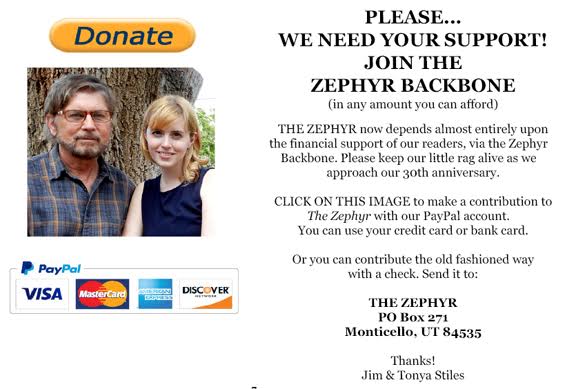
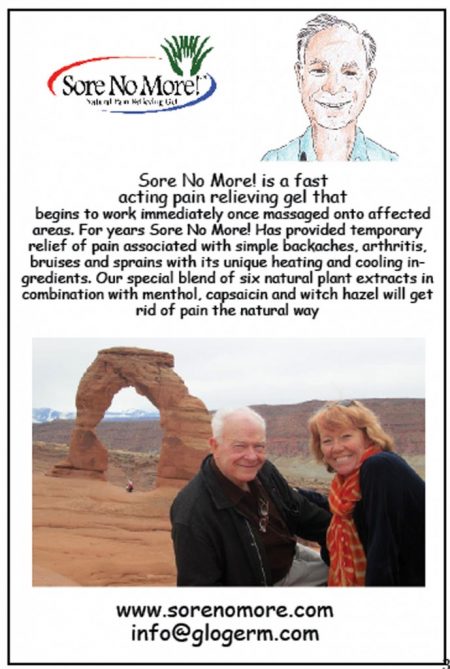


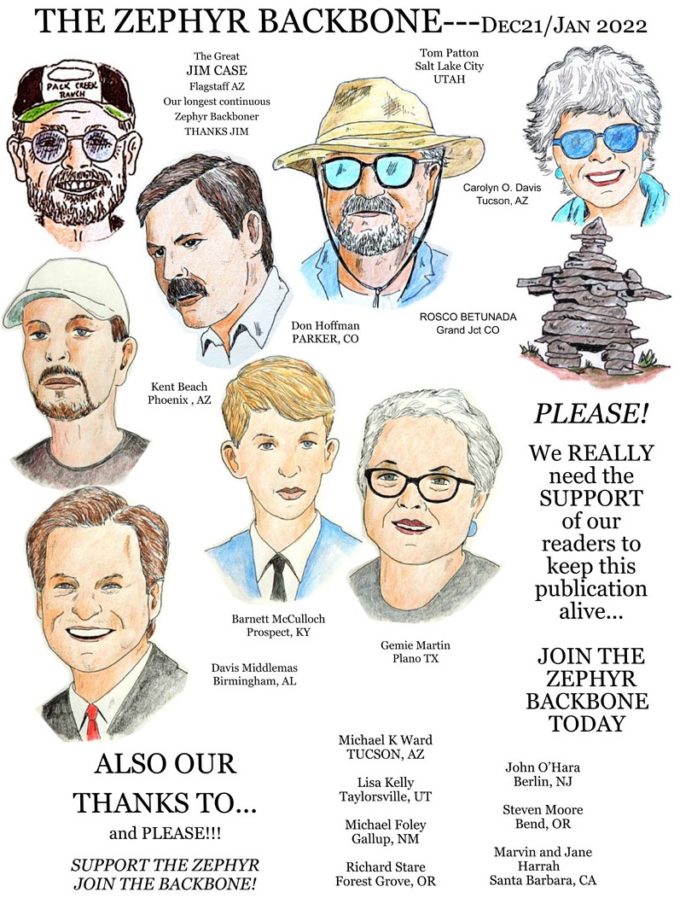
I just finished re-reading one of Tony Hillerman’s novels for the third time and was reminiscing about a trip to the Southwest I took about 25yrs. ago with my then wife Anne, and kids Michelle & Darren. One of the many highlights of that trip was a visit to Tsakurshovi on Second Mesa. To meet Joseph & Janice Day was to be overwhelmed by kindness and integrity. Joseph was extroverted in a very pleasant, non-obnoxious way and Janice was a perfect, people-oriented companion. They gave us many suggestions for our journey, and in retrospect I wish I could have spent more money on my Katsina purchases. I will be returning to the Southwest this spring and will so miss Tsakurshovi. Thank you Joseph & Janice for one of the most gratifying and entertaining shopping experiences I have ever had !
I wish you luck & happiness in your retirement.
This is a lovely piece. So true. Don’t we all miss the people , community and cultural life we leave once we retire. Maybe that’s why I haven’t fully quit. And on those days that I work, I fall into the routine of coffee at my regular stop with the people I huddled with each morning before my “semi-retirement.”
I am sorry but happy to hear that you, Joseph and your wife Janice have been able to retire. I visited Tsakurshovi 2 times in my life and at the last visit about 6 years ago was able to purchse a Butterfly Katsina. Was really looking forward to bringing my husband to the store and to Hopi land. I think Gary is the Hopi man that took us on a tour to some of the sacred petroglyhs and sites on the land. Perhaps we will make it to Hopi Grounds. Sounds wonderful. Was looking forward to purchasing another katsina and “Don’t Worry Be Hopi” shirt. Much love and peace to you all.